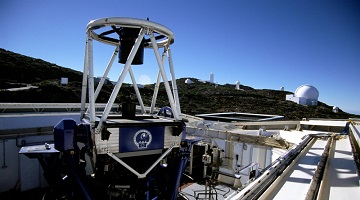2024/25 entry Applications also open for 2025/26
MSc Astrophysics
About this course
This MSc in Astrophysics is delivered by world-leading researchers at Liverpool John Moores University and is designed to facilitate further postgraduate and PhD study.
- Access the two metre research-class robotic Liverpool telescope - designed and built by LJMU experts
- Learn from academics who are world-leading researchers
- Carry out original research in a wide range of areas
- Gain a qualification which facilitates continued study at PhD level
An ideal choice if you prefer the flexibility of studying remotely and gaining a Masters qualification by distance learning. Each module provides the opportunity to explore current literature, with support from experienced tutors, all of whom are engaged in cutting-edge astrophysical research. Many of the research topics are observational studies, which can be supported by access to the Liverpool Telescope, a two metre aperture research-quality robotic telescope, sited on La Palma in the Canary Islands.
The robotic nature of the telescope means that you do not travel to the telescope, but interact with it via a computer interface, giving unrivalled flexibility for studying rapidly changing objects in the night sky. This course is an excellent way to specialise and further your academic career in the exciting and dynamic astrophysics field.
Fees and funding
There are many ways to fund postgraduate study for home and international students
Fees
The fees quoted at the top of this page cover registration, tuition, supervision, assessment and examinations as well as:
- library membership with access to printed, multimedia and digital resources
- access to programme-appropriate software
- library and student IT support
- free on-campus wifi via eduroam
Additional costs
Although not all of the following are compulsory/relevant, you should keep in mind the costs of:
- accommodation and living expenditure
- books (should you wish to have your own copies)
- printing, photocopying and stationery
- PC/laptop (should you prefer to purchase your own for independent study and online learning activities)
- mobile phone/tablet (to access online services)
- field trips (travel and activity costs)
- placements (travel expenses and living costs)
- student visas (international students only)
- study abroad opportunities (travel costs, accommodation, visas and immunisations)
- academic conferences (travel costs)
- professional-body membership
- graduation (gown hire etc)
Funding
There are many ways to fund postgraduate study for home and international students. From loans to International Scholarships and subject-specific funding, you’ll find all of the information you need on our specialist postgraduate funding pages.
Please be aware that the UK’s departure from the EU may affect your tuition fees. Learn more about your fee status and which tuition fees are relevant to you.
Employability
Further your career prospects
LJMU has an excellent employability record with 96% (HESA 2018) of our postgraduates in work or further study six months after graduation. Our applied learning techniques and strong industry connections ensure our students are fully prepared for the workplace on graduation and understand how to apply their knowledge in a real world context.
This Astrophysics MSc programme is particularly focussed on preparing you for a research career in astronomy, astrophysics, space science or related disciplines. In these areas, entry to top-level research is almost always via the PhD route, and it is anticipated that most of the students taking this MSc will be interested in further study at PhD level and beyond. The ARI has a long-standing and healthy PhD programme and we are well-placed to help you in applying for PhD places on our own programme and in other institutions worldwide.
The MSc itself provides the opportunity for you to plan and complete a substantial programme of original research at the highest level. All projects should have the potential to result in papers in refereed journals.
The student experience
Discover life as a postgraduate student at LJMU.
News and views
Browse through the latest stories and updates from the University and beyond
Course modules
Discover the building blocks of your programme
Your programme is made up of a number of core modules which are part of the course framework. Some programmes also have optional modules that can be selected to enhance your learning in certain areas and many feature a dissertation, extended report or research project to demonstrate your advanced learning.
Core modules
Astrophysics Project
60 credits
This module develops the skills required to undertake real scientific research. It enables you to:
- work independently on an original problem
- display qualities and skills such as initiative, ingenuity and communication
- develop and analyse independent research
Astrophysical Concepts
30 credits
This module develops your understanding of concepts in astrophysics. It:
- develops your knowledge of grounding in orbital mechanics and the formation and evolution of planetary systems.
- provides an understanding of the physical processes which determine all aspects of the structure and evolution of stars.
- introduces you to the diversity of galaxy morphologies, dynamics evolution and components.
- allows you to illustrate the importance of multi-wavelength observational approaches to the study of galaxies.
Astronomical Techniques
30 credits
Cosmology
30 credits
This module provides the theoretical background required to understand various cosmological models including the favoured CDM model. It:
- gives an understanding of modern observational cosmology
- enables you to make detailed cosmological measurements from galaxy or cluster survey data
Optional Modules
Numerical Methods in Astrophysics
30 credits
This module aims to give students an understanding of programming basics and provide students with practical experience of using computational techniques extensively employed by researchers in astronomy and astrophysics.
There will be particular emphasis on developing independent learning skills and IT capability to access and extract relevant scientific information via the Virtual Learning Environment and databases available from LJMU.
Time-Domain Astrophysics
30 credits
This module aims to develop your understanding of the transient Universe, and the techniques and facilities used to investigate this realm. It provides a sound understanding of the physical processes driving phenomena such as explosive transients. It:
- introduces the concepts of time domain astrophysics and the techniques used to analyse and understand it
- develops your independent learning skills and IT capability to access and extract relevant scientific information
Teaching
An insight into teaching on your course
Study hours
This is a distance learning programme; thus, you will define your own particular study hours. The UK recommendation is to allocate 10 hours of study per credit on the course.
Teaching methods
You will learn through pre-recorded lectures, directed reading, focused literature review exercises, coursework assignments, student discussion groups and tutorials. All learning materials are delivered by LJMU's Virtual Learning Environment. You will have access to all the major astrophysical research journals and a carefully selected range of e-books to support your studies and extend your reading.
Applied learning
Access to The Liverpool Telescope means that you can put your learning into practice.
Assessment
How learning is monitored on your programme
To cater for the wide-ranging content of our courses and the varied learning preferences of our students, we offer a range of assessment methods on each programme.
Most of the taught modules on this programme are assessed with a written examination.
Other assignments, designed to support your learning and check progression during the course of the module, may include: quizzes, short essays and critiques of scientific papers.
Other assignments, designed to support your learning and check progression during the course of the module, may include: quizzes, short essays and critiques of scientific papers.
The research project and dissertation are examined by both a written report and an oral presentation/interview. In most cases the oral interviews will be done via video link, though you may opt to come to Liverpool to do this in person.
Course tutors
Our staff are committed to the highest standards of teaching and learning
Dr Stacey Habergham-Mawson
Programme leader
Stacey is the Programme Leader for the MSc Astrophysics, a unique course which allows students around the world to engage with the cutting-edge research of our department through a fully online masters course.She completed her PhD in 2013 with a research background in core-collapse supernovae and their host galaxies in the local Universe. As an observational astronomer, she carried out observational studies connecting local stellar populations with the flavour of stellar explosion. Supernovae are some of the brightest events in the Universe, but the fact remains that until they explode, we can rarely ever see the individual stars behind such amazing light displays. We need to conduct some detective work - combining clues from the local galaxy environment with the unique signals received during the explosion to determine what happened. Only by doing this can we answer the question of how stars evolve and the physics entwined in the explosion dynamics. Supernovae are the source of almost all of the elements in the periodic table, which allowed for the Earth and life to be created. They are able to help us probe distances, chemistries and extreme physics.
The flexibility of this course allows us to welcome students from all different backgrounds and from around the globe. It's a privilege to introduce them to our research and our university.
-

-
 Professor
Professor
School facilities
What you can expect from your School
Although this is a distance learning programme, you will be able to access the Liverpool Telescope, one of the world's largest robotic telescopes, which was designed, built and is now owned and operated by LJMU.
Entry requirements
You will need:
Qualification requirements
Undergraduate degree
- a minimum 2:2 in the physical sciences or a STEM discipline (e.g. science, technology, engineering, mathematics, etc.)
- a good knowledge of basic physics at degree level, and competence in mathematical techniques including calculus, differential equations and complex numbers
International requirements
-
IELTS
- IELTS 6.5 (minimum of 5.5 in each component)
-
Other international requirements
- As this is a Distance Learning programme the usual rules in terms of UK Visas and Immigration restrictions to full-time study do not apply
Further information
-
Extra Requirements
- a satisfactory reference from your employer or line manager
-
RPL
- RPL is accepted on this programme
Application and selection
Securing your place at LJMU
To apply for this programme, you are required to complete an LJMU online application form. You will need to provide details of previous qualifications and a personal statement outlining why you wish to study this programme.
Applicants who do not hold a degree in a relevant subject will be considered on their individual merits in relation to the programme. Professional experience, publications, CPD activities and other suitable evidence of accomplishment will be taken into account.
The University reserves the right to withdraw or make alterations to a course and facilities if necessary; this may be because such changes are deemed to be beneficial to students, are minor in nature and unlikely to impact negatively upon students or become necessary due to circumstances beyond the control of the University. Where this does happen, the University operates a policy of consultation, advice and support to all enrolled students affected by the proposed change to their course or module.










